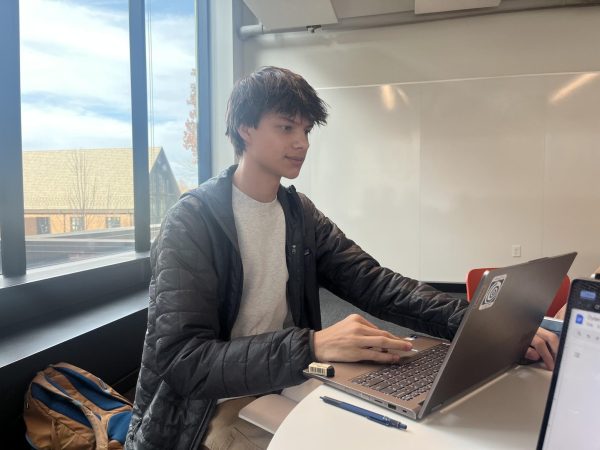High school is treated as the time to experiment with new interests and within the US, a number of opportunities arise every year in which students are able to participate in. From Advanced Science Research to Advanced Technology Projects to the arts, students are offered the freedom to explore their interests on a large scale.
Junior Milan Mishra is working on a method for algae bloom monitoring using drones and machine learning. As a part of the Advanced Technology Projects class, his detector aims to automate the detection process by using the drone to take photos and analyze the images.
Mishra plans to finish within the next month or two to be able to present his final product at the Twin Cities Regional Science Fair later this school year.
“I became interested in the class as I’ve always seen people working on cool projects in past years, and I knew I wanted to have some sort of long-term project,” he said. (read more below)
Junior Adam Ebert has also been working on a device with real-life implementations: a robot that can locate a person or area while avoiding obstacles.
I’ve always been interested in electrical engineering
— Adam Ebert
He plans for the robot, named FollowBot, to be used in the medical field and assist the elderly, as it can carry important objects and follow the user to a specific location. Having only started the project two weeks ago, Ebert expects the most challenging part to be the triangulation method or the way it locates objects, which is crucial to how the robot will work.
“It’s kind of just one of those issues where you first have to understand the math, you first have to do the math on paper, algebraically, and then you have to implement that into code. And if you didn’t know, computers don’t play nice with algebra,” he said.
Junior Ellie Putaski has been drafting a one-act titled “Still Here”, featuring several musical numbers that she hopes to direct. “Still Here” follows themes of nostalgia, growing up, and the fear of moving on as the main character meets her childhood best friend in her old hometown, who only she can see or remember.
“It’s been interesting doing research for styles of [instrumentals] and what I should include, as well as different characters. What key should it be in, time signature, stuff like that,” Putaski said.
In the future, Putaski wants to major in music for college. She views the one-act version of “Still Here” as a stepping stone to creating larger musical works.
Meanwhile, Ebert’s FollowBot project is a way for him to learn new skills.
“I’ve always been interested in electrical engineering and computer science, and so this kind of melds both really nicely,” he said.
Although the students work on different projects, they all have similar advice to give: start small, think it through, and take it one step at a time.
“Make sure that whatever you want to do is within your means, and that you like the topic enough so you won’t go crazy thinking about it for long periods of time,” Mishra said.
Although these projects are forecasted to take an extended amount of time, a highly anticipated end product will come as a result.
Mishra uses drones and AI to combat algae blooms in lakes and ponds

In the Advanced Technology Projects class, students aren’t just learning about tech; they innovate by creating projects to solve problems. Junior Milan Mishra’s project integrates drones and artificial intelligence to address a pressing environmental issue: algae blooms in lakes and ponds. Algae blooms are problematic as they can sicken or kill animals and raise treatment costs for drinking water.
“In the Advanced Technology Projects class at SPA, we’re given the better part of a year to choose an independent project. You pick one thing, work on that, and then write up a paper for the Twin Cities Science Fair in the spring,” said Mishra. He will present his work to a panel of judges and compete to continue to the national level.
Mishra’s project involves drones and AI to identify whether or not lakes and ponds have algae blooms. “You create a flight plan for the drone, and it takes standard images of the lakes. Then, it uses AI to determine the likelihood of an algae bloom,” said Mishra.
Mishra then takes the image back to the lake that was captured, and he uses a camera. “I use a special camera that uses near-infrared pictures. This allows me to construct a map showing where chlorophyll is in the water,” said Mishra. “If there’s more chlorophyll, then there’s more algae, and you might have an algae bloom.”
Mishra’s project, however, requires involvement outside of SPA. To get a camera that uses near-infrared pictures, he had to loan one from a local company based in the Twin Cities. “Companies that sell these cameras are typically for agricultural reasons, so they’re pretty expensive,” said Mishra.
Students like Mishra are solving real-world problems through innovation and new technologies. Mishra’s project is tackling a critical environmental preservation issue using a variety of technological devices. Protecting aquatic ecosystems is at the heart of Mishra’s project. “Algae blooms can have detrimental effects on aquatic ecosystems, so detecting and monitoring them efficiently is crucial for environmental conservation,” said Mishra.
This article has been revised to reflect the following update: a focused piece on Milan Mishra’s project (written by Lucy Thomas) was added to the story.